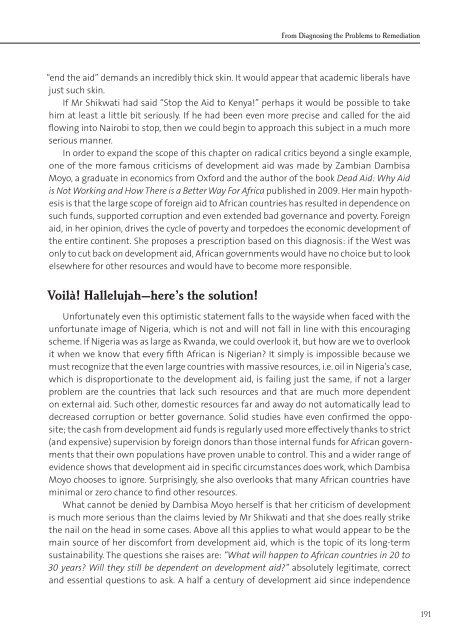Giant_and_Dwarf-FIN
Giant_and_Dwarf-FIN
Giant_and_Dwarf-FIN
You also want an ePaper? Increase the reach of your titles
YUMPU automatically turns print PDFs into web optimized ePapers that Google loves.
From Diagnosing the Problems to Remediation“end the aid” dem<strong>and</strong>s an incredibly thick skin. It would appear that academic liberals havejust such skin.If Mr Shikwati had said “Stop the Aid to Kenya!” perhaps it would be possible to takehim at least a little bit seriously. If he had been even more precise <strong>and</strong> called for the aidflowing into Nairobi to stop, then we could begin to approach this subject in a much moreserious manner.In order to exp<strong>and</strong> the scope of this chapter on radical critics beyond a single example,one of the more famous criticisms of development aid was made by Zambian DambisaMoyo, a graduate in economics from Oxford <strong>and</strong> the author of the book Dead Aid: Why Aidis Not Working <strong>and</strong> How There is a Better Way For Africa published in 2009. Her main hypothesisis that the large scope of foreign aid to African countries has resulted in dependence onsuch funds, supported corruption <strong>and</strong> even extended bad governance <strong>and</strong> poverty. Foreignaid, in her opinion, drives the cycle of poverty <strong>and</strong> torpedoes the economic development ofthe entire continent. She proposes a prescription based on this diagnosis: if the West wasonly to cut back on development aid, African governments would have no choice but to lookelsewhere for other resources <strong>and</strong> would have to become more responsible.Voilà! Hallelujah—here’s the solution!Unfortunately even this optimistic statement falls to the wayside when faced with theunfortunate image of Nigeria, which is not <strong>and</strong> will not fall in line with this encouragingscheme. If Nigeria was as large as Rw<strong>and</strong>a, we could overlook it, but how are we to overlookit when we know that every fifth African is Nigerian? It simply is impossible because wemust recognize that the even large countries with massive resources, i.e. oil in Nigeria’s case,which is disproportionate to the development aid, is failing just the same, if not a largerproblem are the countries that lack such resources <strong>and</strong> that are much more dependenton external aid. Such other, domestic resources far <strong>and</strong> away do not automatically lead todecreased corruption or better governance. Solid studies have even confirmed the opposite;the cash from development aid funds is regularly used more effectively thanks to strict(<strong>and</strong> expensive) supervision by foreign donors than those internal funds for African governmentsthat their own populations have proven unable to control. This <strong>and</strong> a wider range ofevidence shows that development aid in specific circumstances does work, which DambisaMoyo chooses to ignore. Surprisingly, she also overlooks that many African countries haveminimal or zero chance to find other resources.What cannot be denied by Dambisa Moyo herself is that her criticism of developmentis much more serious than the claims levied by Mr Shikwati <strong>and</strong> that she does really strikethe nail on the head in some cases. Above all this applies to what would appear to be themain source of her discomfort from development aid, which is the topic of its long-termsustainability. The questions she raises are: “What will happen to African countries in 20 to30 years? Will they still be dependent on development aid?” absolutely legitimate, correct<strong>and</strong> essential questions to ask. A half a century of development aid since independence191


